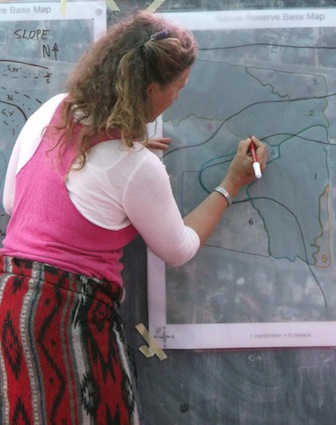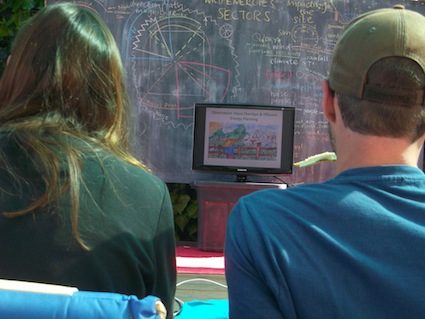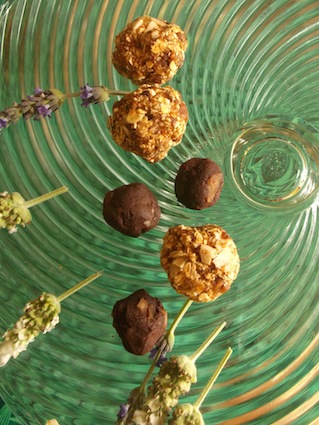Dear Reader, in this age of AI created content, please support with your goodwill someone who works harder to provide the human-made. Sign up at the top of the lefthand column or bottom of this page. You will receive my hand illustrated monthly newsletter RESTORE NATURE and access to the biodiversity garden design course as I write...and nothing else, I respect your time. I am also removing the advertizing as best I can as its become intrusive inappropriate and pays me nothing.
permaculture design course

classes at the permaculture design course take place on a wooden platform covering a huge water reservoir, an old swimming pool
I’m currently attending an intensive permaculture design course in Noordhoek, South Africa, offered by Alex Kruger and Tahir Cooper. I've learned that permaculture is so much more than vegetable garden layout, companion planting and composting regimes but is more about eco sensitivity and developing a man made system that not only regulates itself but regenerates the earth and can be maintained with economy of effort.
Organic vegetable growing is only one of the applications of permaculture, which on a larger scale usually includes forestry, food forest building, aqua culture and other forms of farming.
About twenty of us are in the middle of this certificate course. Thus far it has been a wonderful experience. I love to be with other permaculture nerds and Alex and Tahir have supplied us abundantly with what we need most. Their depth of knowledge is awe inspiring and evidence of enormous passion, dedication and curiosity, and continues to unfold its richness day by day as we benefit from their experience.

alex explains unit consolidation during the permaculture design course
We have touched on many topics, from the principles of collaborative and accelerated learning, to the patterning of nature, of rocks, leaves and living things from a set of basic mathematical patterns. Every night we watch Allan Savory and Jeff Lawton videos, on the functioning of natural and man-made non-degenerative systems.
The learning process is intense. I'd recommend that anyone attending the permaculture design course stays over in Noordhoek, because you will need that time given to traveling to absorb everything and make the most of the experience. There are many options, the cheapest probably being camping at the caravan park close by. I travel daily for two hours, but I've a very supportive husband who has shouldered cooking and early morning drop offs.

Jenna and jordan intrigued by the sector analysis
To give those new to permaculture a better understanding of what it is, I think that I need to define it, because I myself have been misled, or had preconceptions which were really inaccurate. This description is taken from a definition we formed communally.
Permaculture is based on science although there is also a spiritual dimension, and is focussed on the management of resources such as water, soil, biomass, plants, food, sunshine, land shape, animals and people, and supplies a set of design tools geared at using these resources without generating waste, in a system which supplies its own input from a given piece of land and the forces which operate on it like sun, rain and wind. At the cutting edge of permaculture a wide palette of sciences are used as a toolbox to create a regenerative environment. It is a design system which produces an ecology steered by humans, that tends towards regulating itself, a system which serves people. But beyond this permaculture is a process whose ethics and principles can be applied to all aspects of reality, though its not a magic bullet and doesn’t fit every context. The underlying pattern in nature is unity of all living things, as they all impact each other, and oneness is one law with many applications. If humans attempt to recreate this in spirit it favours decentralization, equality, sustainability and regeneration rather than the degeneration of resource bases. Permaculture designs to achieve greater levels of abundance as opposed to the depleting outcomes of our current economic and agrarian systems. The old agricultural system can be by contrast, be seen as a harvesting system, exploiting the land and its yield. Permaculture is not a harvesting system aimed at extraction, but a production system which puts back more than it takes, regenerating soil where it has deteriorated, rehydrating land on which the water supply has dried up, spreading the power of food production in a network of small production units rather than centralizing it in big food chains.

maria and miky out in the field for the practical learning part of the permaculture design course
After an initial input stage, listening to talks and watching educational videos, we are working on the design process. We observe our site and its existing natural ecosystems, including animals and plants, the mineral and water cycles and human impact, in as much detail as our experience and knowledge allows. Out of this mass of rich data, which we are collecting in the laboratory of a local open space, patterns begin to form, which coalesce into clear and understandable units or spatial areas, united by common characteristics which can involve aspect, vegetation, access and exposure to various environmental influences.
A primary focus thus far has been water management. This is integrated with the conservation of soil and energy by managing water to produce more fertile living soils, and using gravity to do the work as far as possible. The farm practice uses earthworks to capture water, lead it where it is needed for regeneration, and re-hydrate the land. The water is then used to practice animal husbandry and ecological aggro forestry, with permanent crops.
In a very wet climate the permanent crops can be vegetables such as taro,
in a dryer climate vegetable growing has to be minimized. In an urban setting,
or on a farm, vegetables can be grown for private use close to the house, by
using gray water and rain tanks. But even the urban permaculture garden has
less space occupied by lettuces and more space occupied by food producing trees, shrubs and herbs, because of their respective water consumption.
In further articles I’ll get back to Permaculture ethics and principles, and how these are integrated into design.

dedication and thanks before lunch as practiced at the permaculture design course
sitemap for finding your way around the green topics
------
------
vegetable gardening the natural low cost way
------
Yeomans keyline system for water conservation
------
Alex Kruger speaking on permaculture ethics and people

exquisite coffee break accompaniments by larissa
Restore Nature Newsletter
I've been writing for four years now and I would love to hear from you
Please let me know if you have any questions, comments or stories to share on gardening, permaculture, regenerative agriculture, food forests, natural gardening, do nothing gardening, observations about pests and diseases, foraging, dealing with and using weeds constructively, composting and going offgrid.
SEARCH
Order the Kindle E-book for the SPECIAL PRICE of only
Prices valid till 30.09.2023
Recent Articles
-
garden for life is a blog about saving the earth one garden at a time
Apr 18, 25 01:18 PM
The garden for life blog has short articles on gardening for biodiversity with native plants and regenerating soil for climate amelioration and nutritious food -
Cape Flats Sand Fynbos, Cape Town's most endangered native vegetation!
Apr 18, 25 10:36 AM
Cape Flats Sand Fynbos, a vegetation type found in the super diverse Cape Fynbos region is threatened by Cape Town's urban development and invasive alien plants -
Geography Research Task
Jan 31, 25 11:37 PM
To whom it may concern My name is Tanyaradzwa Madziwa and I am a matric student at Springfield Convent School. As part of our geography syllabus for this
"How to start a profitable worm business on a shoestring budget
Order a printed copy from "Amazon" at the SPECIAL PRICE of only
or a digital version from the "Kindle" store at the SPECIAL PRICE of only
Prices valid till 30.09.2023







